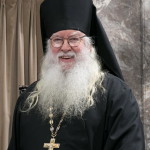![washing_feet_01[1]](https://holytrinitydanbury.org/wp-content/uploads/2016/04/washing_feet_011-300x164.jpg) The Washing of the Feet
The Washing of the Feet
The events initiated by Jesus at the Mystical.Supper were profoundly significant. By teaching and giving the disciples His final instructions and praying for them as well, He revealed again His divine Sonship and authority. By establishing the Eucharist, He enshrines to perfection God’s most intimate purposes for our salvation, offering Himself as Communion and life. By washing the feet of His disciples, He summarized the meaning of His ministry, manifested His perfect love and revealed His profound humility. The act of the washing of the feet (John 13:2-17) is closely related to the sacrifice of the Cross. Both reveal aspects of Christ’s kenosis. While the Cross constitues the ultimate manifestation of Christ’s perfect obedience to His Father (Philippians 2:5-8), the washing of the feet signifies His intense love and the giving of Himself to each person according to that person’s ability to receive Him (John 13:6-9).
Prayer in the Garden
The Synoptic Gospels have preserved for us another significant episode in the series of events leading to the Passion, namely, the agony and prayer of Jesus in the Garden of Gethsemane (Matthew 26:36-46; Mark 14:32-42; Luke 22:39-46).
Although Jesus was Son of God, He was destined as man to accept fully the human condition, to experience suffering and to learn obedience. Divesting Himself of divine prerogatives, the Son of God assumed the role of a servant. He lived a truly human existence. Though He was Himself sinless, He allied Himself with the whole human race, identified with the human predicament, and experienced the same tests (Philippians 2:6-11; Hebrews 2:9-18).
The moving events in the Garden of Gethsemane dramatically and poignantly disclosed the human nature of Christ. The sacrifice He was to endure for the salvation of the world was imminent. Death, with all its brutal force and fury, stared directly at Him. Its terrible burden and fear – the calamitous results of the ancestral sin – caused Him intense sorrow and pain (Hebrews 5:7). Instinctively, as man He sought to escape it. He found Himself in a moment of decision. In His agony He prayed to His Father, “Abba, Father, all things are possible to thee; remove this cup from me; yet not what I will, but what thou wilt” (Mark 14:36).
His prayer revealed the depths of His agony and sorrow. It revealed as well His “incomparable spiritual strength (and) immovable desire and decision . . . to bring about the will of the Father.” Jesus offered His unconditional love and trust to the Father. He reached the extreme limits of self-denial “not what I will” – in order to accomplish His Father’s will. His acceptance of death was not some kind of stoic passivity and resignation but an act of absolute love and obedience. In that moment of decision, when He declared His acceptance of death to be in agreement with the Father’s will, He broke the power of the fear of death with all its attending uncertainties, anxieties and limitations. He learned obedience and fulfilled the divine plan (Hebrews 5:8-9).
The Betrayal
Judas betrayed Christ with a kiss, the sign of friendship and love. The betrayal and crucifixion of Christ carried the ancestral sin to its extreme limits. In these two acts the rebellion against God reached its maximum capacity. The seduction of man in paradise culminated in the death of God in the flesh. To be victorious evil must quench the light and discredit the good. In the end, however, it shows itself to be a lie, an absurdity and sheer madness. The death and resurrection of Christ rendered evil powerless.
On Great Thursday light and darkness, joy and sorrow are so strangely mixed. At the Upper Room and in Gethsemane the light of the kingdom and the darkness of hell come through simultaneously. The way of life and the way of death converge. We meet them both in our journey through life.
In the midst of the snares and temptations that abound in the world around and in us we must be eager to live in communion with everything that is good, noble, natural, and sinless, forming ourselves by God’s grace in the likeness of Christ.
– See more at: http://lent.goarch.org/holy_thursday/learn/#sthash.dIH307bv.dpuf

![lastsupper[1]](https://holytrinitydanbury.org/wp-content/uploads/2016/04/lastsupper1-300x126.jpg) y of Holy Week four events are commemorated: the washing of the disciples’ feet, the institution of the Sacrament of the Holy Eucharist at the Last Supper, the agony in the garden of Gethsemane, and the betrayal of Christ by Judas.
y of Holy Week four events are commemorated: the washing of the disciples’ feet, the institution of the Sacrament of the Holy Eucharist at the Last Supper, the agony in the garden of Gethsemane, and the betrayal of Christ by Judas.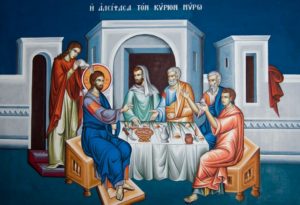
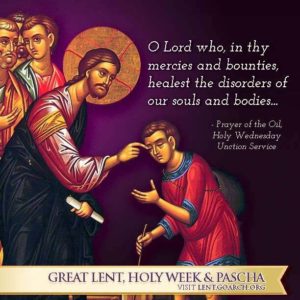
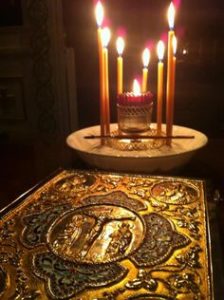
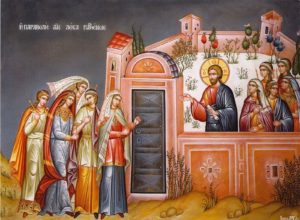
![bridegroom-1[1]](https://holytrinitydanbury.org/wp-content/uploads/2016/04/bridegroom-11-217x300.jpg)
